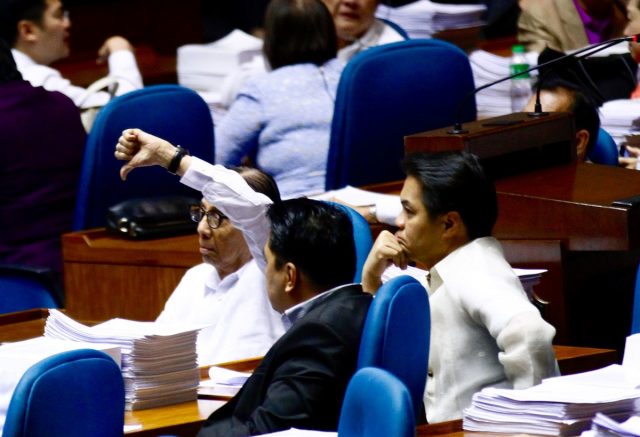
MANILA – They may have been outnumbered but lawmakers who voted “no” to President Duterte’s request to extend martial law in Mindanao for a year – for the entire 2018 – and suspend the privilege of the writ of habeas corpus delivered a clear warning on the constitutional perils of taking that road.
“We don’t ask for unlimited martial law; we ask for unlimited peace,” concluded Executive Secretary Medialdea’s presentation of the Executive branch’s basis for seeking the one-year extension and suspension of the privilege of the writ of habeas corpus.
Buhay party-list Rep. Lito Atienza was not persuaded, however, by the argument that the power will not be abused. As one of the interpellators of the Executive officials who attended Congress’ joint session on Wednesday morning, he warned that allowing for another extension could be tantamount to an “indefinite” utilization by a president of his martial law powers, in a throwback to the Marcos martial law. The 1987 Constitution crafted after the overthrow of Marcos was precisely worded to avoid such abuse, noted Atienza, who was an opposition member of the Batasan during the dictatorship.
If the basis for the proclamation is no longer the Marawi siege, argued Atienza, then the President should issue a new proclamation, good for 60 days, not seek to keep extending his May 23, 2016 proclamation when Marawi was laid siege to by the ISIS-inspired Maute Group.
Atienza, senior deputy minority leader, said the Executive was effectively “circumventing” the 60-day limitation contemplated by the Constitution, repeating the question he raised when he opposed the first extension during Congress’ joint session in July, where he also voted “no.”
“How can extension be longer than the original?” he asked, adding, “Never again should the President be allowed to utilize martial law indefinitely.”
Atienza said he was not questioning the basis of the first proclamation, or the “intentions of the President,” but merely drawing attention to a clear restriction issued by the 1987 Constitution to prevent abuse of martial law powers.
ALEJANO: POLITICAL, NOT SECURITY AGENDA SERVED
Magdalo Rep. Gary Alejano, a former military officer, said the cycles of “rebellion and secession” will not be solved by another extended martial law, and would be unfair to the people and even to the military.
“I support our Armed Forces and anything that would make them effective in the performance of their mandate,” said Alejano in his explanation of vote. “But I voted NO for the extension of martial law for one year in the entire Mindanao region” for several reasons:
1. Marawi crisis is over and there’s no basis for extending martial law for another year.
2. Extending martial law runs counter to the 1987 Constitution which states that martial law would be declared when there is actual rebellion or invasion and when public safety requires it. “It is clear that no such thing exist. Reports on continuing recruitment of terrorists and skirmishes with NPA could not be the basis for imposing martial law.”
3. There is no stopping the president and the armed forces from going after terrorists even without declaring martial law. Martial law is not equivalent to combat operations.
4. The military can very well arrest suspected terrorists and search houses during combat operations as what have been done before even in the absence of martial law.
5. Defense and intelligence infrastructure are in place in Mindanao and were provided with operational and intelligence funds. Arrest or search warrants could be secured from courts when supported with solid intelligence information. Relying on martial law to arrest a person is short of admitting that intelligence gathering is inefficient.
6. Extending martial law for one year is an admission that civilian authority no longer functions, which necessitates military rule, which is not the case.
7. Prolonged exposure of the military to martial law could weaken civilian supremacy over the military — a fundamental principle of our democracy.
8. While President Duterte is using the NPA to justify extension of martial law for one year, he is sleeping with their allies in government.
9. While President Duterte orders manhunt for the NPA, he was the one who appointed allies of the communists to sensitive government positions, which influenced policies and used funds in their respective agencies to support their legal fronts and expand their mass bases.
10. The reason behind the imposition of martial law and its extension is not to address security problems in the country, but to pursue certain political agenda of this administration. This is at our expense, the military, and the Filipino people.
11. Rebels, terrorists, secessionists have been there since the 70s. They are not new. In varying degrees they all have been soliciting foreign funding, conducted terroristic acts like beheading, bombings, kidnappings. It is not new that foreign fighters are killed in the rebel camps and hideouts. Numerous all out wars have been carried out by the military in the past but it did not solve the problems. On the contrary, our security situation has aggravated.
LAGMAN: NO BASIS FOR EVEN A DAY’S EXTENSION
For his part, Albay Rep. Edcel Lagman said an extension of martial law in Mindanao, “even for one day, much more for one full year, has no factual anchorage and constitutional basis.”
Besides the “cavalier assertion of the military and police authorities that there is a ‘continuing rebellion’ in Mindanao, there is no well-documented support for such contrived submission,” stressed Lagman.
The threats of terrorism and violence in Mindanao do not constitute a constitutional ground for extension of martial law, added Lagman, “because imminent danger has been deleted by the 1987 Constitution as a ground for the declaration of martial law and its authorized extension.”
In his view, “any further extension of martial law is unconstitutional because such extension of an extension is not allowed under the Constitution because what is authorized is only the extension of the original proclamation.”
He warned also of the danger to democracy of a series of extensions. Such “would defy the clear intent of the Constitution for a limited period of martial law and its extension, wherein the initiatory proclamation should not even exceed 60 days. Any extension is subject to the same constitutional constraints on the limited period.”
KIKO: THREAT FROM TERRORISTS, REBELS NOT BASIS FOR EXTENSION
Sen. Kiko Pangilinan began by citing Art VII Section 18 of the Constitution: “Upon the initiative of the President, the Congress may, in the same manner, extend such proclamation or suspension for a period to be determined by the Congress, IF the invasion or rebellion shall PERSIST and public safety requires it.”
In Pangilinan’s view, “Walang na hong aktwal na rebelyon. Hindi kailangan para sa kaligtasan ng bayan. The threat that terrorists and rebels pose is NOT a basis for an extension of military rule in Mindanao.”
The same provision of the Constitution, Pangilinan noted. gives the President a limited “period not exceeding sixty days [to] suspend the privilege of the writ of habeas corpus or place the Philippines or any part thereof under martial law.”
The Constitution “gives actual rebellion or invasion as the only justification for the declaration of martial law,” adding that “the extreme power of martial law for period of one year in any part of the country WITHOUT ACTUAL REBELLION BUT MERELY A THREAT was never intended by the framers of the 1987 Constitution.”
In fact, Pangilinan pointed out, “our framers amended the section on martial law and removed the provision “or imminent danger thereof,” in the 1935 and the 1973 Constitution.”
The grant of martial law extension, “without actual rebellion for a wholesale period of one year, is not only contrary to the Constitution; it is an abdication of our sacred duty and the surrendering of our power as Congress to act as a check and balance on the executive branch,” Pangilinan concluded.
BELMONTE: LIKE A PIT WE MAY NOT GET OUT OF
Quezon City 6th District Rep. Jose Christopher “Kit” Belmonte voted ‘no” because, “serious security concerns call for intensified intelligence and operational efforts on the part of the military; but it is not reason to call for an extended martial law.”
The power to determine the period of an extension of a declaration of martial law is conditioned “upon persisting conditions of actual invasion or rebellion,” said Belmonte, adding, “mere threats or perceived threats to security do not justify martial law.”
Belmonte, who had also voted NO on the extension of martial law for 150 days when Duterte sought the first extension in July, reminded everyone of the perils of a government being so used to martial law and having it in place for an “indefinite” period.
“I vote NO to another extension of martial law and the corresponding suspension of the privilege of writ of habeas corpus over the whole of Mindanao, this time for a year. I vote no to the normalization of military rule and of authoritarianism. I vote no to efforts to weaken our democratic institutions. I vote no because I fear that we are falling into a pit we may not be able to get out of.”
According to Belmonte, the announcement by Duterte that Marawi had been liberated from terrorist forces meant “the factual bases for martial law ceased to exist,” and “martial law should have been lifted, not extended.”
“Martial law will not solve the real historical, cultural, political, and economic problems of Mindanao, and our nation,” said Belmonte and will even make it difficult to go about the long, difficult process of rebuilding Marawi.
WATCH A RELATED VIDEO REPORT BY NEWS5:









